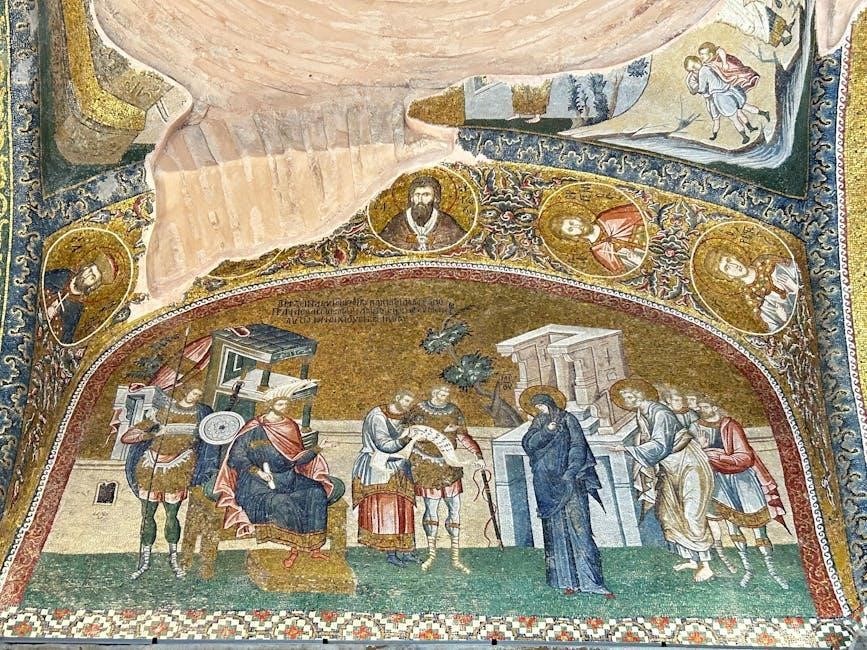manual of the church of the nazarene
The Manual of the Church of the Nazarene serves as the official sourcebook for church governance, doctrine, and practice, guiding members and leaders in faith and mission;
1.1 Overview of the Manual
The Manual of the Church of the Nazarene is the official governing document of the Church, outlining its structure, beliefs, and practices. It serves as a comprehensive guide for members and leaders, detailing church governance, doctrine, rituals, and policies. The Manual also includes historical context, core values, and operational guidelines, ensuring unity and consistency across the global Nazarene community. It is regularly updated to address contemporary challenges and maintain relevance in a changing world.
1.2 Historical Development of the Manual
The Manual of the Church of the Nazarene has evolved significantly since its inception in 1908. Initially, it focused on unifying the church’s early doctrines and organizational framework. Over the years, revisions have incorporated theological insights, cultural adaptations, and practical applications to meet the changing needs of the global church. This historical development reflects the church’s commitment to maintaining its Wesleyan-Holiness roots while embracing modern challenges and opportunities.
1.3 Purpose and Importance of the Manual
The Manual of the Church of the Nazarene serves as the foundational document guiding the church’s doctrine, practices, and governance. It provides clarity on beliefs, organizational structure, and ethical standards, ensuring unity across the denomination. The Manual is essential for clergy and members alike, offering resources for decision-making and spiritual growth. It fosters accountability and consistency, enabling the church to fulfill its mission effectively while remaining faithful to its Wesleyan-Holiness heritage. Its importance lies in its role as a comprehensive guide for both individual and corporate ministry.
Church Governance and Structure
The Manual outlines the governance framework, detailing organizational structures, leadership roles, and operational policies to ensure effective management aligned with the church’s mission and values.
2.1 Organizational Structure of the Church
The Church of the Nazarene operates through a hierarchical structure, with local churches organized into districts, which are further grouped into regions. At the global level, the General Assembly serves as the supreme governing body, overseeing policies and decisions. This structured framework ensures unity and consistency across all levels, facilitating effective communication and collaboration. The Manual elaborates on this system, providing clear guidelines for governance and operational procedures.
2.2 Roles and Responsibilities of Church Leaders
Church leaders in the Church of the Nazarene are entrusted with guiding the congregation spiritually, overseeing governance, and fostering community engagement. Pastors, as spiritual leaders, preach, provide pastoral care, and administer sacraments. District superintendents and general superintendents oversee broader church operations, ensuring alignment with doctrine and mission. Leaders are also responsible for nurturing discipleship and promoting holistic ministry. Their roles emphasize stewardship, accountability, and equipping believers for service, ensuring the church remains faithful to its mission and values.
2.3 The General Assembly and Its Functions
The General Assembly is the supreme governing body of the Church of the Nazarene, convening every four years to set policy, elect leaders, and address key issues. It ensures doctrinal integrity, maintains global unity, and amends the church manual. This assembly reflects the church’s mission to make Christlike disciples, providing strategic direction and fostering unity among its global membership, ensuring alignment with its core values and vision.
Doctrine and Theology
The Church of the Nazarene’s doctrine centers on Wesleyan-Holiness theology, emphasizing salvation, entire sanctification, and living a holy life. It upholds the authority of Scripture and core beliefs.
3.1 Core Beliefs of the Church of the Nazarene
The Church of the Nazarene is rooted in Wesleyan-Holiness theology, emphasizing salvation, entire sanctification, and a life of holiness. It affirms the authority of Scripture, the deity of Christ, and the work of the Holy Spirit. Key beliefs include the possibility of entire sanctification as a second work of grace, the importance of personal and social holiness, and the mission to make Christlike disciples. These teachings guide the church’s doctrine, practices, and mission to spread God’s love and redemption globally.
3.2 The Articles of Faith
The Articles of Faith are the foundational beliefs of the Church of the Nazarene, outlining its theological framework. They affirm the Triune God, the inspiration of Scripture, and salvation through Jesus Christ. Key doctrines include humanity’s sinful nature, the atonement, and the resurrection. These articles emphasize the transformative work of the Holy Spirit, leading to entire sanctification. They serve as a comprehensive guide, ensuring unity and clarity in the church’s teachings and practices, grounded in Scripture and Wesleyan-Holiness tradition.
3.4 The Role of Scripture in Church Doctrine
The Bible is the supreme authority in Church of the Nazarene doctrine, serving as the inspired and inerrant Word of God. Scripture guides all beliefs, practices, and decisions, emphasizing the transformative power of God’s truth. It is central to preaching, teaching, and worship, providing the foundation for holiness living and mission. The church affirms the Old and New Testaments as the ultimate rule of faith and conduct, shaping its understanding of God, humanity, and salvation through Christ.

Worship and Practices
Worship in the Church of the Nazarene is centered on prayer, sacraments, and the Word, fostering a holy and transformative encounter with God. Practices include communion, baptism, and discipleship-focused ministries, emphasizing spiritual growth and community engagement.
4.1 Sacraments and Ordinances
The Church of the Nazarene observes two sacraments: baptism and the Lord’s Supper. Baptism, typically by immersion, symbolizes the believer’s death, burial, and resurrection with Christ. The Lord’s Supper commemorates Christ’s sacrifice and is open to all believers. Ordinances, such as dedication and marriage, are also practiced, reflecting the church’s commitment to holy living. These sacred acts are administered by ordained ministers and are central to the church’s worship and spiritual life, fostering a deeper connection with God and the community.
4.2 Worship Services and Liturgy
Worship services in the Church of the Nazarene are central to the church’s life, blending structured liturgy with spontaneous expressions of faith. Services typically include prayer, singing, Scripture reading, and a sermon, led by ordained ministers. The liturgy reflects the church’s holiness tradition, emphasizing personal and corporate devotion. Communal participation is encouraged, fostering a sense of unity and shared worship. The services are designed to honor God, edify believers, and extend an invitation to experience His presence, aligning with the church’s mission to make Christlike disciples.
4.3 Discipleship and Spiritual Formation
Discipleship and spiritual formation are central to the Church of the Nazarene’s mission to make Christlike disciples. The church emphasizes nurturing believers through intentional spiritual growth, fostering a deep relationship with Christ. Small groups, mentorship, and Bible studies are key methods for discipleship. Spiritual practices such as prayer, fasting, and meditation are encouraged to cultivate holiness and maturity. The church’s focus on spiritual formation aligns with its mission to help believers live out their faith in practical, transformative ways, reflecting the teachings of Jesus Christ.

Mission and Evangelism
The Church of the Nazarene’s mission is to make Christlike disciples globally, emphasizing evangelism, compassionate ministry, and holistic transformation through the love of Christ.
5.1 The Mission Statement of the Church
The mission of the Church of the Nazarene is to make Christlike disciples in the nations. It emphasizes spreading the gospel, compassionate ministry, and holistic transformation, reflecting God’s love and justice; The church seeks to integrate the spiritual and social dimensions of the gospel, fostering communities of faith that embody the teachings of Jesus Christ. This mission is central to its global efforts, guiding its evangelistic strategies and outreach initiatives worldwide.
5.2 Global Mission Efforts
The Church of the Nazarene actively engages in global mission efforts, spreading the gospel across nations. It establishes local churches, trains leaders, and provides compassionate ministries. Through partnerships and missionaries, the church addresses spiritual and physical needs, fostering holistic transformation. Global mission efforts emphasize cultural sensitivity and sustainability, ensuring that communities are empowered to thrive. These initiatives reflect the church’s commitment to fulfilling the Great Commission and making Christlike disciples worldwide.
5.3 Evangelism Strategies and Practices
The Church of the Nazarene employs diverse evangelism strategies to share the gospel effectively. Personal witnessing, community outreach, and discipleship programs are central to its approach; The church also utilizes technology and media to reach broader audiences. Emphasizing relational evangelism, members are encouraged to build connections and share their faith authentically. These practices aim to create environments where individuals can experience spiritual transformation and grow in their relationship with Christ, aligning with the church’s mission to make Christlike disciples globally.
Clergy Development and Training
The Church of the Nazarene emphasizes clergy development through rigorous education, ordination processes, and ongoing training, ensuring ministers are equipped to lead effectively in various ministries.
6.1 Ministerial Education and Training
Ministerial education in the Church of the Nazarene is centered on equipping clergy with theological knowledge and practical skills. The Modular Course of Study is a key resource, providing structured learning for ministers. Rigorous educational requirements ensure clergy are prepared to lead effectively. This training emphasizes both academic and hands-on experiences, fostering spiritual growth and leadership development. Studies highlight the positive impact of such education on pastors’ effectiveness in guiding small churches and fulfilling the church’s mission. Continuous learning is encouraged to meet modern ministry challenges.
6.2 Ordination Process and Requirements
The ordination process in the Church of the Nazarene requires candidates to complete a rigorous educational program, demonstrating theological understanding and ministerial competence. Candidates must meet specific requirements, including character assessments, doctrinal exams, and practical ministry experience. The Modular Course of Study is a key component, ensuring comprehensive preparation. Ordination is granted through a formal process, affirming the candidate’s call to ministry and readiness to serve as a spiritual leader. This process underscores the church’s commitment to raising qualified, Spirit-called ministers.
6.3 Continuing Education for Clergy
The Church of the Nazarene emphasizes ongoing clergy development through continuing education, ensuring ministers remain equipped for effective ministry. Resources like the Modular Course of Study and theological journals provide opportunities for deeper theological understanding. Clergy are encouraged to engage in lifelong learning to enrich their ministries and address contemporary challenges. This commitment to education reflects the church’s dedication to fostering spiritually vibrant and intellectually prepared leaders who can navigate the complexities of modern ministry with integrity and effectiveness.

Membership and Community Involvement
The Church of the Nazarene encourages members to actively engage in spiritual growth and community outreach, fostering a culture of discipleship and compassionate service to others.
7.1 Membership Requirements and Expectations
Membership in the Church of the Nazarene requires a personal profession of faith in Jesus Christ, acceptance of its doctrines, and adherence to moral standards. Members are expected to participate in worship, observe sacraments, and support the church’s mission. Active involvement in the life of the church, including stewardship of time, talents, and resources, is encouraged. Members are also called to uphold the church’s values and contribute to its community and outreach efforts.
7.2 Small Groups and Fellowship
Small groups within the Church of the Nazarene are essential for fostering community and spiritual growth. These groups provide a setting for Bible study, prayer, and mutual encouragement, helping members deepen their faith. Fellowship activities strengthen relationships and create a sense of belonging. Small groups also serve as platforms for discipleship and outreach, equipping members to live out their faith effectively. Participation in these groups is highly encouraged as they play a key role in nurturing holistic discipleship and community engagement.
7.3 Community Service and Outreach
The Church of the Nazarene emphasizes community service and outreach as vital expressions of its mission. Members are encouraged to engage in acts of compassion, such as feeding the hungry, visiting the sick, and caring for the marginalized. Outreach initiatives, including disaster relief and youth programs, reflect the church’s commitment to spreading Christ’s love. These efforts foster meaningful connections and demonstrate the church’s role as a transformative presence in society, aligning with its mission to make Christlike disciples.

Financial Stewardship
Financial stewardship in the Church of the Nazarene involves responsible management of resources, ethical budgeting, and accountability to ensure funds align with the church’s mission and values.
8.1 Church Funding and Budgeting
Church funding and budgeting in the Church of the Nazarene are centered on tithes, offerings, and allocations from local congregations. The budgeting process ensures resources align with the church’s mission and values. Financial transparency and accountability are emphasized to maintain trust and integrity. Leaders are expected to manage funds ethically, prioritizing ministries, outreach, and community service. The church encourages responsible stewardship to support both local and global initiatives, reflecting its commitment to holistic mission and discipleship.
8.2 Tithing and Offerings
Tithing and offerings are central to the financial practices of the Church of the Nazarene, rooted in biblical principles of stewardship. Members are encouraged to give a tithe (10% of income) as an act of worship and obedience. Offerings beyond the tithe support specific ministries, missions, and community needs. These contributions are vital for sustaining local churches and funding global outreach efforts, reflecting the church’s commitment to faith, generosity, and service.
8.3 Financial Integrity and Accountability
Financial integrity and accountability are foundational principles in the Church of the Nazarene, ensuring responsible stewardship of resources. The church adheres to transparent budgeting, regular audits, and ethical financial practices. Annual financial reviews and reports are conducted to maintain trust and credibility. Proper stewardship of tithes, offerings, and other funds is emphasized to honor God and support the church’s mission effectively.

Challenges and Controversies
The Church of the Nazarene faces modern challenges, including declining membership and adapting to cultural shifts, while addressing controversies in doctrine and practice.
9.1 Modern Challenges Facing the Church
The Church of the Nazarene confronts contemporary challenges such as declining membership, cultural shifts, and adapting to technological advancements. Maintaining relevance while preserving core values is crucial. Financial pressures and evolving societal expectations further complicate ministry efforts. Additionally, addressing generational divides and fostering unity amid diversity remain significant tasks. The church must innovate in outreach and discipleship while ensuring theological integrity. These challenges require strategic leadership and a commitment to prayerful discernment to navigate effectively in a rapidly changing world.
9.2 Controversies in Church Doctrine and Practice
The Church of the Nazarene has faced debates over theological interpretations, cultural adaptation, and certain practices. Controversies arise regarding the balance between maintaining traditional doctrines and addressing modern societal changes. Issues such as theological liberalism, charismatic practices, and inclusivity have sparked discussions. Additionally, disagreements over specific policies, like same-sex marriage and ordination, have led to internal divisions. These controversies highlight the tension between upholding foundational beliefs and embracing diversity in a evolving global context.

9.3 Addressing Declining Membership
The Church of the Nazarene has implemented strategies to address declining membership, focusing on revitalizing local churches and engaging younger demographics. Efforts include community outreach programs, discipleship initiatives, and modernizing worship services. Emphasizing the church’s mission to make Christlike disciples, leaders are encouraged to foster meaningful connections and adapt to cultural shifts. Additionally, clergy development and training programs aim to equip pastors with tools to revitalize congregations and address the challenges of a changing world while remaining faithful to core values.

The Future of the Church of the Nazarene
The Church of the Nazarene envisions a future focused on innovative ministry, global outreach, and adapting to societal changes while staying true to its core values.
10.1 Vision for the 21st Century
The Church of the Nazarene’s vision for the 21st century emphasizes fostering a global community of Christlike disciples. By innovating ministries and embracing cultural shifts, the church aims to remain relevant while holding fast to its Wesleyan-holiness roots. This vision includes expanding digital outreach, empowering local churches, and equipping leaders to address contemporary challenges effectively, ensuring the gospel message resonates across diverse contexts and generations.
10.2 Innovations in Ministry and Outreach
The Church of the Nazarene is embracing innovative strategies to reach diverse populations. Digital platforms are being utilized for virtual worship, online discipleship, and global connectivity. Community-focused initiatives emphasize compassion and justice, addressing local needs while sharing the gospel. Leadership development programs are also being refined to equip ministers for multicultural and intergenerational ministries. These efforts aim to adapt traditional methodologies to contemporary contexts, ensuring the church remains a vibrant force in global mission and evangelism.
10.3 Ensuring Relevance in a Changing World
The Church of the Nazarene prioritizes adaptability to remain relevant in a dynamic global landscape. By embracing cultural sensitivity and leveraging technology, the church connects with diverse populations. Community-focused initiatives and collaborative partnerships address contemporary challenges, fostering compassion and justice. Leadership encourages a mindset of continuous learning and innovation, ensuring that the church’s mission remains impactful. This commitment to relevance enables the church to fulfill its calling in an ever-evolving world while staying true to its core values and mission.

